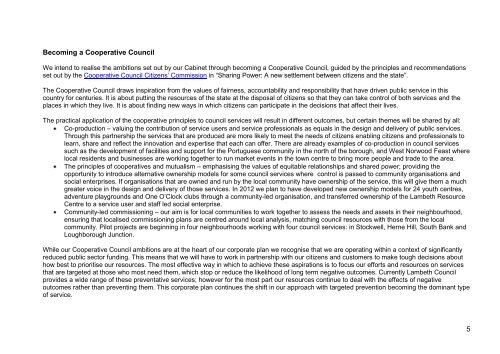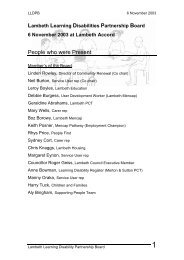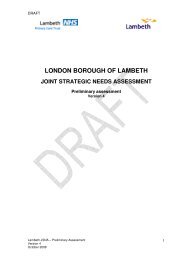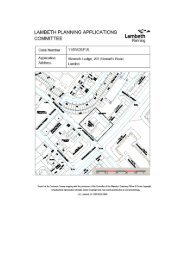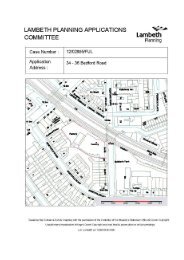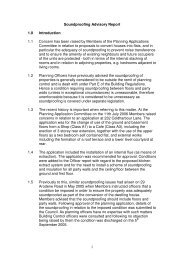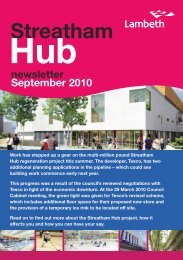Corporate Plan 2012 - 2015 - Lambeth Council
Corporate Plan 2012 - 2015 - Lambeth Council
Corporate Plan 2012 - 2015 - Lambeth Council
Create successful ePaper yourself
Turn your PDF publications into a flip-book with our unique Google optimized e-Paper software.
Becoming a Cooperative <strong>Council</strong><br />
We intend to realise the ambitions set out by our Cabinet through becoming a Cooperative <strong>Council</strong>, guided by the principles and recommendations<br />
set out by the Cooperative <strong>Council</strong> Citizens’ Commission in “Sharing Power: A new settlement between citizens and the state”.<br />
The Cooperative <strong>Council</strong> draws inspiration from the values of fairness, accountability and responsibility that have driven public service in this<br />
country for centuries. It is about putting the resources of the state at the disposal of citizens so that they can take control of both services and the<br />
places in which they live. It is about finding new ways in which citizens can participate in the decisions that affect their lives.<br />
The practical application of the cooperative principles to council services will result in different outcomes, but certain themes will be shared by all:<br />
Co-production – valuing the contribution of service users and service professionals as equals in the design and delivery of public services.<br />
Through this partnership the services that are produced are more likely to meet the needs of citizens enabling citizens and professionals to<br />
learn, share and reflect the innovation and expertise that each can offer. There are already examples of co-production in council services<br />
such as the development of facilities and support for the Portuguese community in the north of the borough, and West Norwood Feast where<br />
local residents and businesses are working together to run market events in the town centre to bring more people and trade to the area.<br />
The principles of cooperatives and mutualism – emphasising the values of equitable relationships and shared power; providing the<br />
opportunity to introduce alternative ownership models for some council services where control is passed to community organisations and<br />
social enterprises. If organisations that are owned and run by the local community have ownership of the service, this will give them a much<br />
greater voice in the design and delivery of those services. In <strong>2012</strong> we plan to have developed new ownership models for 24 youth centres,<br />
adventure playgrounds and One O’Clock clubs through a community-led organisation, and transferred ownership of the <strong>Lambeth</strong> Resource<br />
Centre to a service user and staff led social enterprise.<br />
Community-led commissioning – our aim is for local communities to work together to assess the needs and assets in their neighbourhood,<br />
ensuring that localised commissioning plans are centred around local analysis, matching council resources with those from the local<br />
community. Pilot projects are beginning in four neighbourhoods working with four council services: in Stockwell, Herne Hill, South Bank and<br />
Loughborough Junction.<br />
While our Cooperative <strong>Council</strong> ambitions are at the heart of our corporate plan we recognise that we are operating within a context of significantly<br />
reduced public sector funding. This means that we will have to work in partnership with our citizens and customers to make tough decisions about<br />
how best to prioritise our resources. The most effective way in which to achieve these aspirations is to focus our efforts and resources on services<br />
that are targeted at those who most need them, which stop or reduce the likelihood of long term negative outcomes. Currently <strong>Lambeth</strong> <strong>Council</strong><br />
provides a wide range of these preventative services; however for the most part our resources continue to deal with the effects of negative<br />
outcomes rather than preventing them. This corporate plan continues the shift in our approach with targeted prevention becoming the dominant type<br />
of service.<br />
5


